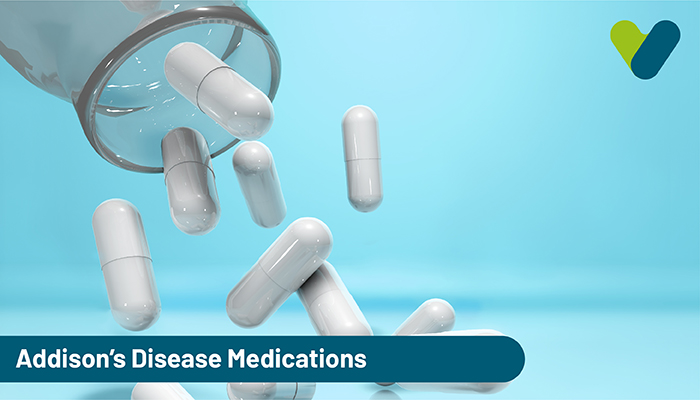Corticosteroid replacement therapy is commonly used to treat Addison's disease. The medications must be taken for the remainder of the life from the onset or diagnosis of the condition. Corticosteroid medication is typically consumed orally (by mouth) as a substitute for the aldosterone and cortisol, which the body cannot produce.
Numerous Addison’s disease medicines, typically in the form of pills, are available to treat Addison's disease. The levels of a particular hormone that the body is lacking is used to determine the medication for this condition.
The outlook is favourable if corticosteroids replacement therapy is continued, but patients must strictly adhere to their doctor's recommendations.
Medicine for Addison’s Disease
There is no cure for Addison's disease, but treatment can help manage the symptoms and prevent complications. Medications are a crucial component of treatment for Addison's disease, and several different types of medicines may be used as a treatment plan. Which medicines are required to treat Addison's disease effectively is determined on the basis of the hormones that are no longer effectively produced in the adrenal glands. Among the potential medications are the following:- Corticosteroids, such as hydrocortisone and prednisone, are the most commonly used medications for Addison's disease. These hormones mimic the function of cortisol, which is normally produced by the adrenal glands. Corticosteroids are used to replace the missing cortisol and help regulate blood pressure, metabolism, and the body's response to stress. They are typically taken in the form of a pill, and the dosage may be adjusted based on a person's symptoms and blood tests that measure the level of cortisol in the blood.
- Fludrocortisone is a medication used to replace the missing aldosterone. Aldosterone helps regulate blood pressure and the balance of fluids in the body. Fludrocortisone is usually taken in the form of a pill and helps prevent dehydration and low blood pressure.
- Salt supplements may also be recommended for people with Addison's disease. Because aldosterone helps regulate the balance of fluids in the body, some people with Addison's disease may need to consume more salt to help maintain blood pressure.
- Dehydroepiandrosterone (DHEA) pills may be prescribed if an androgen (male sex hormone) deficiency exists.
It is important to note that people with Addison's disease will need to take their medications for life. Once treatment has been initiated, regular monitoring of the patient by an endocrinologist is necessary to adjust the dosage to adapt to changes in the body.
Side effects of addison’s disease medications
Some adverse effects of hydrocortisone and fludrocortisone include slow wound healing, sleep problems, nausea, dizziness, acne, and excessive sweating.The side effects of DHEA in women are similar to those specified above, but they may additionally experience a deepening of the voice, facial hair growth, and changes in the menstrual cycle.
The frequency with which a patient must take medication is determined by the severity of their symptoms and the level of their hormone deficiency. As a result, patients' treatment plans will be adjusted over time by a healthcare professional.
Complications arising during Addison’s disease treatment
There are numerous risk factors that should be considered since the disease is managed with the help of medications that are required to be consumed for the remainder of a patient's life.When a person with Addison's disease encounters the following symptoms, exercise extreme caution:
- Illness: If the patient becomes ill, their hormone levels may be affected, making their medications less effective in relieving symptoms.
- Surgery: Adrenal gland dysfunction is an important aspect during surgery; people with the disease will have to be monitored closely and may have their treatment modified during and after surgery.
- Pregnancy: Hormone levels change when a patient becomes pregnant. Medication may need to be adjusted on a regular basis during pregnancy in order to be effective. Adrenal insufficiency medication may have to be increased during times of injury, stress, or infection. If the patient vomits, the medications may need to be administered intravenously.
Adrenal crisis is a potentially fatal condition in which blood pressure, blood glucose levels, and potassium levels are dangerously low. In this condition, the patient will require
immediate medical attention, which will most likely include:
- Saline
- Dextrose
- Intravenous injections of hydrocortisone

